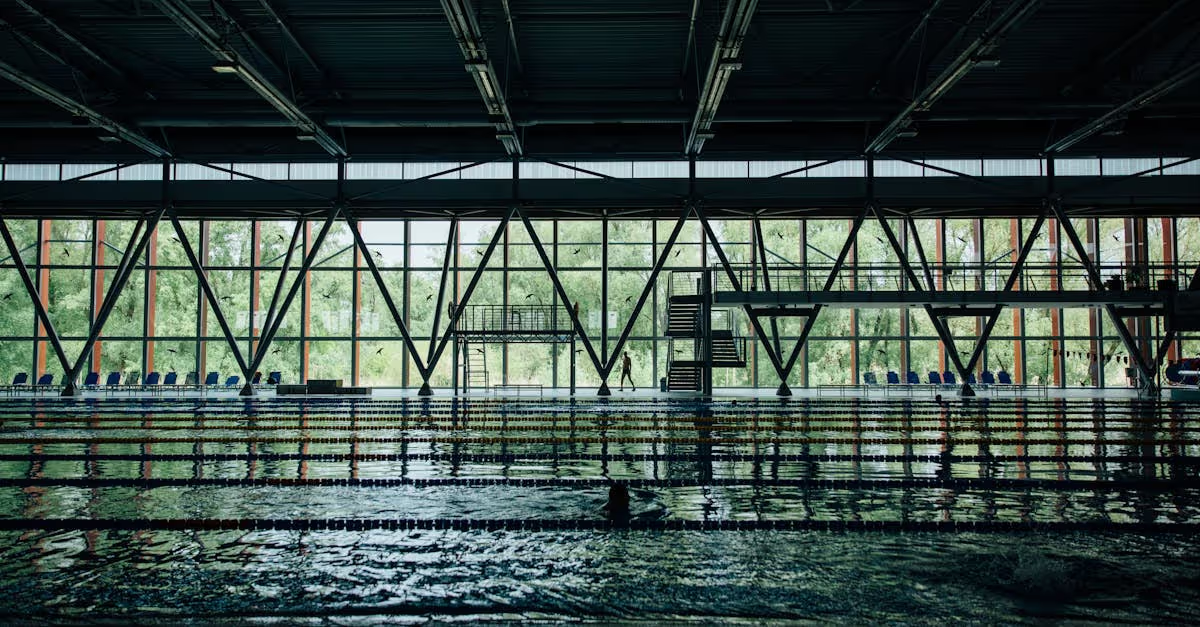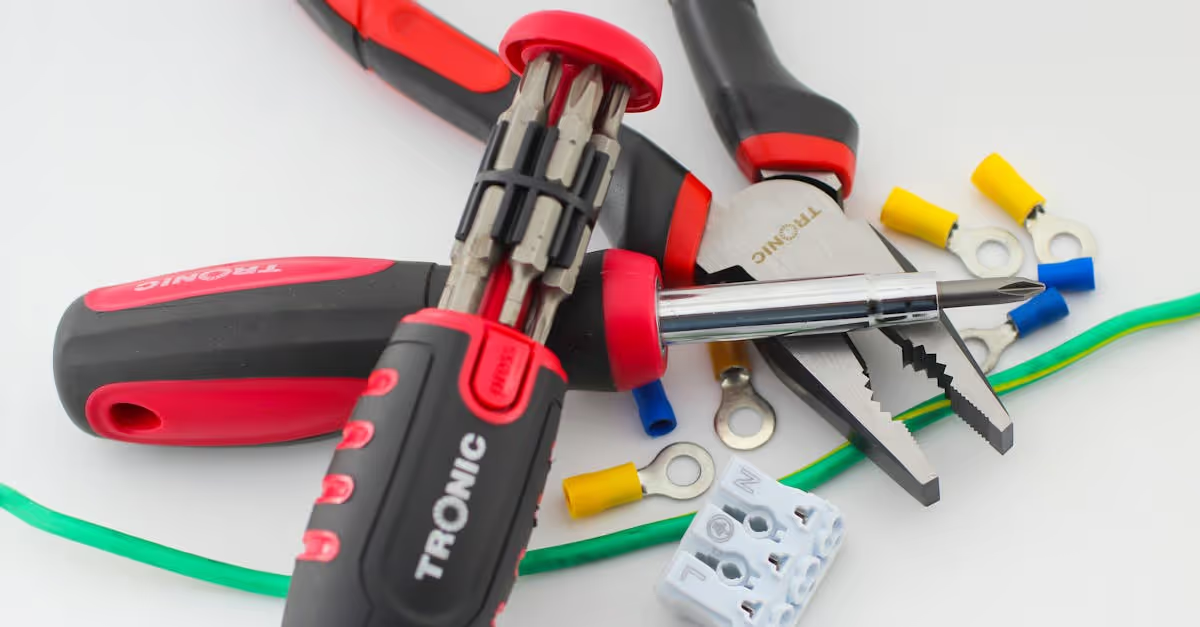Key Takeaways
- Custom Fit Importance: Tailoring pool covers to unique pool shapes and sizes prevents gaps that can accumulate debris and reduce safety, ensuring better cleanliness and energy efficiency.
- Types of Pool Covers: Different options include safety covers, mesh covers, solid covers, and automatic covers, each serving specific needs and enhancing overall pool experience.
- Accurate Measurements: Engaging professionals for precise pool measurements is crucial in designing an effective custom cover that minimizes evaporation and improves pool upkeep.
- Design Considerations: Key factors in custom pool cover design include material selection, color aesthetics, and safety features to ensure functionality and security for families and pets.
- Maintenance and Care: Regular inspection and proper cleaning of pool covers help maximize their longevity and performance, providing effective protection throughout the year.
- Cost Factors: Understanding the costs associated with materials and professional installation enables pool owners to make informed choices that align with their budget and pool needs.
When it comes to pool ownership, protecting our investment is key. Did you know that a well-fitted pool cover can reduce evaporation by up to 90% and lower heating costs by 50%? As we dive into the world of custom pool covers, it’s essential to understand how to design one that fits our unique pool shapes and sizes.
Standard covers often fall short, leaving gaps that can lead to debris accumulation and safety hazards. By exploring the ins and outs of custom designs, we can ensure our pools remain safe, clean, and energy-efficient year-round. Let’s uncover the essential steps to create the perfect cover that meets our specific needs.
Understanding Custom Pool Covers
Custom pool covers cater to diverse pool shapes and sizes, playing a crucial role in maintaining pool cleanliness and safety. These covers operate efficiently in reducing evaporation and lowering heating costs, making them essential for pool owners.
Importance of Customization
Customization provides a perfect fit for different pool shapes, from rectangular to irregular styles. Tailored designs minimize water evaporation and debris buildup, leading to cleaner pools and lower maintenance costs. Custom covers also promote safety by preventing accidents and keeping pets and children out. Have we considered how a well-fitted cover can transform our pool experience into smooth sailing? A cover that fits right can make the difference between a sparkling pool and a murky mess.
Different Types of Pool Covers
Numerous pool cover options cater to various needs. Here’s a quick rundown:
- Safety Covers: Crafted from strong materials, safety covers protect against unintended access.
- Mesh Covers: These allow rainwater to drain while keeping leaves and large debris out.
- Solid Covers: Solid covers are fully waterproof and can prevent algae growth during the off-season.
- Electric and Automatic Covers: Effortless and convenient, these covers operate with the push of a button.
Each type comes with specific advantages. Knowing our options lets us make informed decisions that elevate our pool experience. Which type of cover fits your pool best? Asking ourselves this question leads us to explore our unique requirements.
Assessing Your Pool's Unique Shape and Size
Assessing the specific shape and size of our pool is vital for designing an effective custom cover. This step guarantees a perfect fit that minimizes water evaporation and debris accumulation.
Measuring Your Pool
Accurate measurement is key for a successful custom cover. We recommend engaging a professional for this task, especially for pools with non-standard shapes. Professionals have the right tools and experience to take precise measurements, which means fewer chances for errors. They will consider the pool's length, width, and any irregular dimensions. A well-measured pool cover can reduce evaporation by up to 90% and lower heating costs significantly. Taking the time upfront to get measurements right saves us headaches down the road.
Identifying Unique Features
Each pool has distinct features that impact cover design. We should take into account elements like steps, ledges, and waterfalls. These features complicate cover design but also provide opportunities for creativity. For instance, a pool with integrated steps might need a custom cover that accommodates those areas without compromising its function. We can even think about installing a safety cover with special fittings for these features. Recognizing these aspects not only aids in cover selection but also enhances convenience in pool management. By embracing these differences, we stay ahead in keeping our pools clean and safe throughout the year.
Design Considerations for Custom Pool Covers
Custom pool covers play a vital role in maintaining our pools. Effective design involves several crucial aspects that contribute to functionality, safety, and aesthetics.
Accurate Measurements
Taking precise measurements is essential for crafting a perfect fit. We must measure the length, width, and any curves or angles of the pool. Professional help can prevent mistakes and create a cover that fits snuggly. Good fit reduces issues like water evaporation and debris accumulation, ensuring our pools remain clean and well-maintained.
Material Options
Selecting the right material greatly impacts performance and longevity. Covers can be made from various materials, including mesh, solid vinyl, or automatic systems. Mesh covers allow water to pass through but keep debris out, while solid covers offer full protection from the elements. Automatic options provide convenience, making pool management easier. Our choice depends on our needs and preferences. What do we value more: easy maintenance or complete protection?
Color and Aesthetics
Considering color and design is key for an appealing look. While functionality is crucial, aesthetics can enhance our outdoor space. Many colors and patterns exist, letting us match the cover with our home's exterior or landscape. Choosing a cover that aligns with our style makes the pool area more inviting. Is there a specific color that speaks to us when we imagine our perfect poolside?
Functionality and Safety Features
Functionality is essential for safety and usability. Safety covers often come with features like anchor systems to secure the cover when not in use. Options like locking mechanisms and weight-bearing capabilities prevent accidents, particularly around children and pets. Depending on our situation, a cover designed for safety with added features protects our family and enhances our peace of mind. Have we thought about all the safety options available to us?
With careful consideration of these factors, we can create a custom pool cover that fits our needs perfectly, making our pools safer and more enjoyable.
Installation and Maintenance of Custom Pool Covers
Custom pool covers play an essential role in protecting our pools, but proper installation and maintenance maximize their effectiveness. Let's dive into the key points.
Professional vs. DIY Installation
Choosing between professional installation and DIY depends on a few factors. For most of us, hiring experts for a custom pool cover guarantees a precise fit. Professionals use measurement tools and have experience with various pool shapes. While DIY can save money, it may lead to misfitting covers that don’t perform as well. Installation errors often result in water accumulation, decreasing the cover's lifespan and effectiveness. Did anyone ever try assembling that furniture from the big store and end up with a wobbly chair? The same logic applies here.
Care and Maintenance Tips
Maintaining a custom pool cover ensures its longevity and performance. Regularly check for wear and tear, especially after severe weather. Clean debris off the cover to prevent damage and avoid those awkward moments when we realize the cover's as heavy as a hippo. To clean, use a gentle mixture of soap and water. Rinse thoroughly.
Pool owners should also store the cover properly when not in use, ideally in a dry area. This simple step prevents mildew buildup. If your cover has anchors, inspect them too. Tight, non-corroded anchors keep everything secure. Let's keep our pools safe and sparkling!
Cost Factors for Custom Pool Covers
Custom pool covers vary in cost due to several factors, including materials and installation. Understanding these elements helps us make informed choices that match our pools and budgets.
Material Costs
Material selection significantly impacts the price of custom pool covers. Covers typically consist of mesh, solid, or automatic materials, each with different costs and benefits. For instance, solid covers tend to be pricier due to their thicker fabric, which prevents water and debris from entering the pool. Conversely, mesh covers might be more affordable and allow rainwater to filter through, reducing maintenance.
Quality material also affects longevity. Investing in a durable fabric can minimize replacement costs over time. Prices for these materials range from $1,000 to $4,000 or more, depending on pool size, cover type, and specifics like custom sizes or added safety features.
Installation Expenses
Installation costs represent another essential factor. Professional installation commonly ranges from $200 to $600, contingent on the pool's shape and cover type. Standard shapes, like rectangular pools, often incur lower installation fees. However, irregularly shaped pools may take longer and require higher man-hours to install correctly.
Conclusion
Designing a custom pool cover tailored to our unique pool shapes and sizes is essential for protecting our investment. By prioritizing accurate measurements and selecting the right materials we can ensure our covers provide optimal safety and efficiency.
With the right design considerations and professional installation we can enjoy cleaner pools and reduced maintenance costs. Investing in a custom cover not only enhances the aesthetics of our outdoor space but also contributes to energy savings and overall pool enjoyment.
Let’s take the steps necessary to create the perfect fit for our pools and enjoy the peace of mind that comes with a well-designed cover.
Frequently Asked Questions
What are the benefits of custom pool covers?
Custom pool covers significantly reduce water evaporation by up to 90% and lower heating costs by approximately 50%. They are designed to perfectly fit unique pool shapes, preventing debris buildup and enhancing safety year-round.
How do I measure my pool for a custom cover?
Accurate measurements are crucial for a custom pool cover. It's recommended to engage professionals for precise measurements, especially for non-standard pool shapes. Identify unique pool features to ensure the cover fits properly.
What types of custom pool covers are available?
Custom pool covers come in several types, including safety covers, mesh covers, solid covers, and electric or automatic covers. Each type has specific advantages and benefits, allowing pool owners to choose based on their needs.
How do I maintain my custom pool cover?
To maintain a custom pool cover, regularly check for wear and tear, clean off debris, and store it properly when not in use. This helps prevent issues like mildew buildup and extends the cover's lifespan.
How much do custom pool covers cost?
The cost of custom pool covers varies based on materials and installation. Prices can range from $200 to $600, with solid covers typically being more expensive due to their durability. Irregularly shaped pools may incur higher installation costs.
Should I install my custom pool cover myself?
While DIY installation is an option, it’s often better to have a professional install a custom pool cover to ensure a precise fit. Misfitting covers can lead to inefficiency and safety hazards, making professional help worthwhile.





